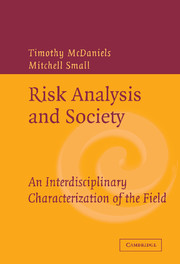Book contents
- Frontmatter
- Contents
- Contributors
- 1 Introduction – Risk Anaysis and Society: An Interdisciplinary Characterization of the Field
- PART ONE FUNDAMENTAL CHARACTER OF RISK
- PART TWO METHODS FOR RISK ASSESSMENT
- PART THREE NEW APPROACHES AND NEEDS FOR RISK MANAGEMENT
- 9 The Challenge of Integrating Deliberation and Expertise: Participation and Discourse in Risk Management
- 10 Global Change and Transboundary Risks
- 11 Environmental Risks and Developing Countries: An Asian Perspective
- SUMMARY AND FUTURE DIRECTIONS
- Index
- References
11 - Environmental Risks and Developing Countries: An Asian Perspective
Published online by Cambridge University Press: 05 June 2012
- Frontmatter
- Contents
- Contributors
- 1 Introduction – Risk Anaysis and Society: An Interdisciplinary Characterization of the Field
- PART ONE FUNDAMENTAL CHARACTER OF RISK
- PART TWO METHODS FOR RISK ASSESSMENT
- PART THREE NEW APPROACHES AND NEEDS FOR RISK MANAGEMENT
- 9 The Challenge of Integrating Deliberation and Expertise: Participation and Discourse in Risk Management
- 10 Global Change and Transboundary Risks
- 11 Environmental Risks and Developing Countries: An Asian Perspective
- SUMMARY AND FUTURE DIRECTIONS
- Index
- References
Summary
INTRODUCTION
Many developing countries in Asia face significant environmental problems consisting of both traditional and modern risks, and overlaps between them, resulting from a delay in their “risk transition” (Edgerton et al., 1990, Smith, 1997). To address such problems, more efficient and integrated environmental management than that historically adopted in the developed countries must be encouraged. Namely, the nations must be able to address and reduce the traditional risks through development activities without producing or worsening the modern risks of environmental pollution and also the damage to natural environments caused, for example, by deforestation and desertification. Moreover, it is likely that further delay in environmental risk management would increase various types of so-called transboundary risks resulting from international movement of contaminated foods or wastes, long-range atmospheric transport of pollutants, GHG (greenhouse gas) emissions, and degradation of the global ecosystem in general (McMichael, 1999). These concerns indicate that more comprehensive risk controls from both domestic and international perspectives are urgently needed.
This chapter presents an overview of the extent to which, and how, environmental health risks have been assessed for developing Asian countries, especially China and Indonesia. Then, data collected through our Human Dimension Programme (HDP) study are reviewed indicating the level of risk knowledge, awareness, and perception of urban residents in these two countries. Finally, an international perspective is provided to help identify desirable risk research projects and approaches to sound risk management and governance.
Information
- Type
- Chapter
- Information
- Risk Analysis and SocietyAn Interdisciplinary Characterization of the Field, pp. 420 - 448Publisher: Cambridge University PressPrint publication year: 2003
References
Accessibility standard: Unknown
Why this information is here
This section outlines the accessibility features of this content - including support for screen readers, full keyboard navigation and high-contrast display options. This may not be relevant for you.Accessibility Information
- 1
- Cited by
